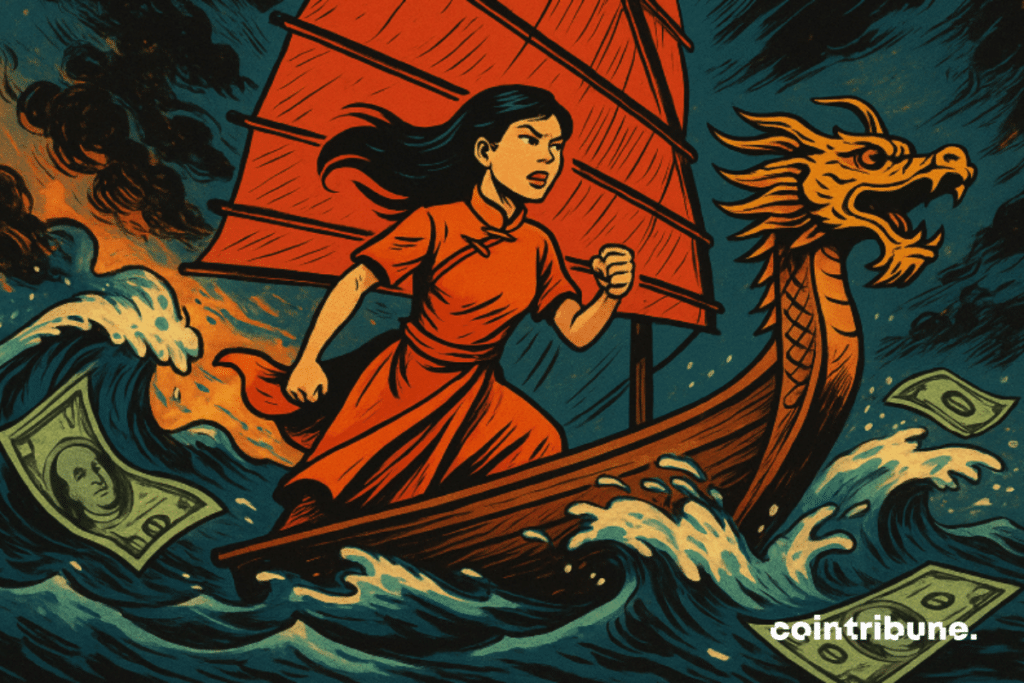18:00 ▪
5
min at reading ▪
It is a paradox that would frown the most experienced economists: while the dollar has vaccinated, the Asian economy straightens with almost harsh insurance. At a time when the US Federal Reserve is a delay in interest rates and when it seems that the tension of trade does not do without it without really dispeling, Asia benefits from unexpected breath. Like what, even in the world of cash mist, some will find their course.

In short
- Asia is still straightening while the dollar suffers.
- Asian markets were reflected in investors.
- The dollar loses its attraction, which strengthens the interest in more agile savings.
Asian markets in full output: When caution becomes an engine
Asian stock markets did not wait for the green light Wall Street to reappear. In the context where US inflation data proved to be less virulent than expected, investors were never reassured, still seduced by the smell of commercial peace.
Result: Asia-Pacific Index (except Japan) offers a jump of 1.1 %, while Hong Kong, led by JD.com and Giants e-commerce, increases by 1.4 %. We saw darker heads.
But behind this awakening in the stock market, the atmosphere remains cozy. Fedimates realize that tariff negotiations, as it obvious, can dive at any time in the infectious fever.
It is not an excitement, but breathing. The breath of measured optimism, as an investor who holds his hand on the railing in case the bridge begins to move.
It should be said that prospects for lower rates, even if they are discussed, create a strong psychological effect: predictiveness.
It seems that the Asian economy, often in the first line in terms of commercial tremor, wants to earn this strategic caution. It is less momentum than the championship that this trend dictates. And that is perhaps what makes his strength.
A dollar in half: Asia dances while America doubts
Meanwhile, the dollar is gray. Assigned by persistent uncertainties around US business negotiations and lack of clarity in upcoming money decisions lost 0.4 %against Yen.
The euro, on the other hand, remains stable, but the report is clear: international investors are gradually leaving American assets, considered too exposed to unpredictable.
According to the Bank of America survey, global asset managers were not so little involved in the dollar for 19 years.
It means whether trust turns. And this dissatisfaction benefits, not surprisingly, from other more dynamic economic poles. By reducing their greenback, funds redirect their capital to markets considered more agile, more interconnected and sometimes more durable.
But beware: it is not so much a weakness of the dollar that drives Asia as its own ability to transform uncertainty into opportunities.
For example, Japan observes its profits in moderation, while China seeks to stabilize its relations with the United States without much noise. It is a diplomatic dance that is played where every incorrect step can endanger everything, but where every measured step can trigger auctions.
Nothing has been obtained at the moment. The trade war between Beijing and Washington is just a break and the dollar could regain muscles if the Fed decides to solve the tone.
But Asia is progressing. Slowly, carefully but surely. Among the still cautious investors, doubts that doubts and the world seeking its deposits, it will restore their balances. The economy is not a race. It’s endurance. And for now, Asia is a rhythm. Bitcoin is essential in this climate. While the dollar loses attraction, investors carefully rotate to the cryptocurrencies.
Maximize your Cointribne experience with our “Read to Earn” program! For each article you read, get points and approach exclusive rewards. Sign up now and start to accumulate benefits.


Evariste, fascinated by Bitcoin since 2017, has not stopped documenting on this topic. If his first interest focused on trading, he now tries to actively understand all cryptocurrency progress. As an editor, he tries to permanently provide high quality work that reflects the condition of the sector as a whole.
Renunciation
The words and opinions expressed in this article are involved only by their author and should not be considered investment counseling. Do your own research before any investment decision.
